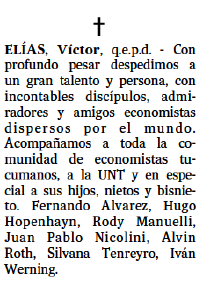The Econometric Society has announced its newest class of Fellows. I don't know them all, but I bet they all deserve that distinction, because it isn't easy to be recognized as a Fellow. More on that after celebrating and congratulating these jolly good Fellows:
The Society is pleased to announce the election of 29 new Fellows of the Econometric Society.
- Nava Ashraf, London School of Economics
- Steve Bond, University of Oxford
- Tilman Börgers, University of Michigan
- Robin Burgess, London School of Economics
- Gabriel Carroll, University of Toronto
- Yongsung Chang, Seoul National University/Bank of Korea
- Dean Corbae, University of Wisconsin – Madison
- Mariacristina De Nardi, University of Minnesota
- Ben Golub, Northwestern University
- Christian Hellwig, Toulouse School of Economics
- Michael Jansson, University of California, Berkeley
- Steven Koch, University of Pretoria
- Thierry Mayer, Sciences Po
- Hyungsik Roger Moon, University of Southern California/Yonsei University
- Georg Nöldeke, University of Basel
- Emanuel Ornelas, Sao Paulo School of Economics – FGV
- Pietro Ortoleva, Princeton University
- Sven Rady, University of Bonn
- Gil Riella, School of Public Policy & Government - FGV
- Uta Schönberg, University of Hong Kong/UCL
- Katsumi Shimotsu, University of Tokyo
- Marciano Siniscalchi, Northwestern University
- Vasiliki Skreta, University of Austin, Texas/UCL
- Zheng Song, Chinese University of Hong Kong
- Yves Sprumont, Deakin University
- Abderrahim Taamouti, University of Liverpool Management School
- Pierre-Olivier Weill, University of California, Los Angeles
- Wei Xiong, Princeton University
- Motohiro Yogo, Princeton University
The 2023 FNC consisted of Gabrielle Demange (Chair) Irene Brambilla, Richard Holden, Dilip Mookherjee, Whitney Newey, Michele Terlit, and Yaw Nyarko.
*********
The great thing about prizes and other recognitions is that they celebrate the accomplishments of the accomplished. The complicated thing about them is that they inevitably leave out many whose accomplishments are deserving of similar celebration.
What makes the Econometric Society Fellows such an interesting recognition is that its procedures are transparent: it's a nomination process followed by an election, and the electorate is the collection of existing Fellows. I participate each year by nominating several Fellows, and then voting for quite a few more.
One flaw in such a system could be that the existing fellows, who initiate many of the nominations, might find it easier to think of people close to them in some sense than to think of equally deserving candidates who aren't so close. The Fellows Nominating Committee (FNC) is an attempt to address this: their job includes nominating deserving candidates who seem likely to have been overlooked, perhaps because they are from parts of the world that seem underrepresented among the existing Fellows.
Each year the number of nominees is a multiple of the number of elected Fellows (if memory serves only around a fifth of the nominees have been elected in recent years). The rules of the election since 2020 are that the threshold to get elected is to be included in 25% of the votes cast (and a single "vote" if I understand correctly is a list submitted by a Fellow that can contain as many of the nominated candidates as he or she wishes to vote for). I say "since 2020" because it is the sense of many of the past and present officers of the Society that we elect too few Fellows each year, and so the threshold has been dropping in an effort to elect more fellows. But the equilibrium response of the voters seems to be to vote for a smaller proportion of the nominees, so that the number of new fellows doesn't seem to be increasing at the hoped for rate.
I don't know of a good model to explain all this, but it might include some notion that the value of being a Fellow (or of receiving other recognition) is a non-monotone function of its scarcity. If we elect too many new Fellows, this might eventually diminish the value (to existing Fellows) of being a Fellow. But (less obviously), if we elect too few Fellows the same thing could happen, if being a Fellow stops being something that people aspire to or even have heard of.
My sense is that being a member of the National Academies is less important among economists than in many sciences precisely because too few economists are elected, so that it comes to seem like a random recognition rather than one that recognizes success as economists define it. One of the reasons that the economics Nobel, awarded yesterday with much fanfare to Claudia Goldin, is so widely applauded, not just in the disciplines in which Nobels are awarded but among the general public as well, is that Nobels are awarded every year in several disciplines, so that they manage to be both a scarce distinction and a familiar one. (Exceptions that test this rule are the Clark medal, awarded each year by the American Economic Association to an economist younger than 40, which has high prestige among American economists even though so few are well recognized enough at that age to be serious contenders, and the Fields medals of the International Mathematical Union, also awarded to up to four scholars under 40, every four years.)
But nothing is perfect. Congratulations again to the new Fellows, who have received the carefully considered and frugally awarded applause of their peers.









